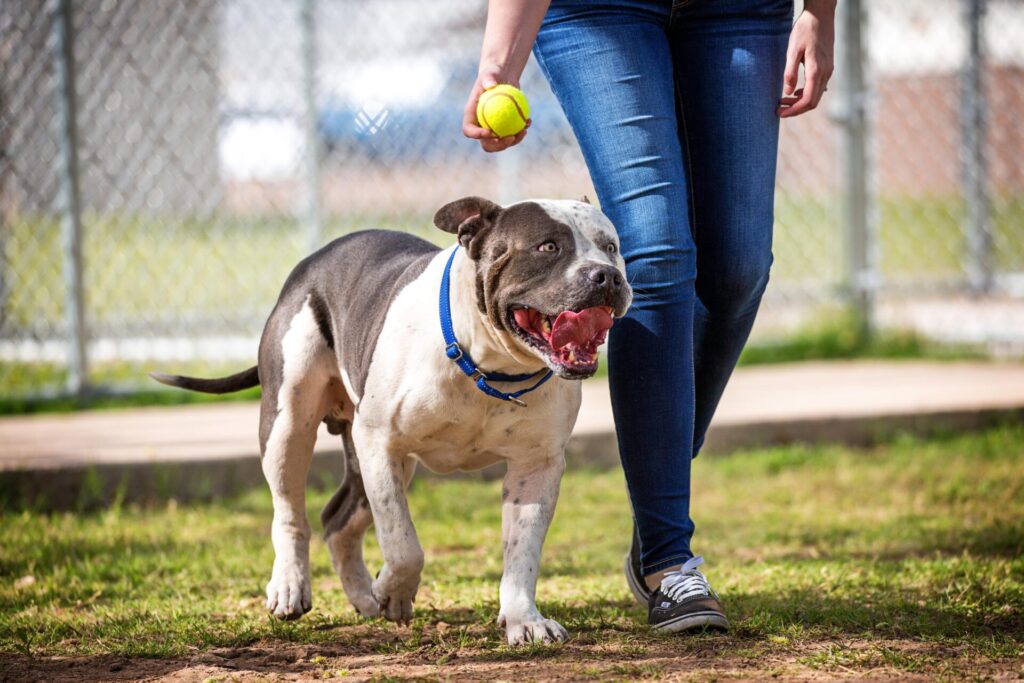Pitbull dogs are a popular breed of dogs known for their muscular build, loyalty, and affectionate nature. Despite their reputation as aggressive and dangerous, these dogs can make great pets with proper training and socialization. In this article, we will explore everything you need to know about pitbull dogs, from their history and characteristics to their care and training.
Introduction
The pitbull dog is a popular breed that has captured the hearts of many dog lovers. Pitbulls are known for their strength, loyalty, and playful nature. However, they have also been the subject of controversy due to their reputation as aggressive and dangerous dogs. In this article, we will explore the history, characteristics, and care requirements of pitbull dogs to help you better understand this breed and determine if it is the right pet for you.
Table of Contents
Pitbull Dog Breed Overview
| Attribute | Response |
|---|---|
| Origin | United States |
| History | Developed for blood sports, now bred as companion |
| Affectionate with Family | Affectionate and loyal |
| Good with children | Good with children if properly socialized |
| Good with other dogs | Can be dog-aggressive, socialization is important |
| Suitable family | Active and experienced, able to provide training |
| Space requirements | Needs daily exercise, a fenced yard is recommended |
| Shedding level | Moderate shedding |
| Coat grooming frequency | Weekly brushing and occasional bathing |
| Coat type | Short and smooth |
| Coat length | Short |
| Drooling level | Low |
| Openness to strangers | Reserved with strangers |
| Playfulness | Energetic and playful |
| Watch/Guard dog | Can be a good watchdog, not typically a guard dog |
| Trainability | Intelligent and trainable, consistent training is needed |
| Energy level | High energy, needs daily exercise and mental stimulation |
| Barking level | Moderate to high |
| Mental stimulation needs | Needs mental stimulation and socialization |
| Dietary requirements | Balanced diet with high-quality protein |
History of Pitbull Dogs
The history of pitbull dogs dates back to the 19th century when they were bred for bull-baiting and dog fighting. However, when these activities were banned in the 20th century, pitbulls were trained for other purposes, such as hunting and herding. Pitbulls are now used as search and rescue dogs, therapy dogs, and family pets.
Types of Pitbull Dogs
There are several types of pitbull dogs, including the American Pitbull Terrier, Staffordshire Bull Terrier, American Staffordshire Terrier, and Bull Terrier. These breeds share similar physical and temperamental characteristics, but they differ in their origin and breeding history.
Characteristics of Pitbull Dogs
Physical Appearance
Pitbull dogs are muscular, medium-sized dogs with short hair and a powerful build. They have a broad head, strong jaws, and a stocky body. Pitbulls come in a variety of colors, including black, blue, red, and brindle.
Temperament

Pitbulls are affectionate, loyal, and playful dogs that love spending time with their owners. They are also highly intelligent and trainable, making them great family pets. However, pitbulls can be aggressive towards other dogs and animals if not properly socialized and trained.
Health Concerns
Like all dogs, pitbulls are prone to certain health issues, such as hip dysplasia, allergies, and skin infections. It is important to schedule regular check-ups with your veterinarian to ensure your pitbull is healthy and receiving proper care.
Pros and Cons of Owning a Pitbull Dog
Owning a pitbull dog can be a rewarding experience, but it is important to consider the pros
and cons before bringing one into your home. Some pros of owning a pitbull dog include their loyalty, affectionate nature, and intelligence. They also make great exercise partners and are known to be protective of their owners.
However, some cons of owning a pitbull dog include their potential for aggression towards other dogs and animals, which can make them challenging to socialize. Pitbulls also have a strong prey drive, which means they may chase after smaller animals like cats or rabbits. Additionally, some cities and states have breed-specific legislation that may restrict or ban pitbull ownership.
Pros of owning a pitbull dog:
- Affectionate: Pitbulls are often described as affectionate and loyal dogs that form strong bonds with their owners.
- Active: Pitbulls are energetic dogs that love to play and exercise, making them great companions for active owners.
- Protective: Pitbulls are naturally protective of their owners and their home, which can make them excellent watchdogs.
- Intelligent: Pitbulls are intelligent dogs that are quick to learn new commands and tricks. With proper training, they can excel in obedience, agility, and other dog sports.
Cons of owning a pitbull dog:
- Aggressive: Pitbulls have a reputation for being aggressive and dangerous dogs. While this is not true for all pitbulls, it is important to understand that they can be prone to aggressive behavior if not trained and socialized properly.
- Legal restrictions: Pitbulls are banned in some countries and cities due to their reputation for being aggressive. This can make it difficult for owners to find housing or travel with their dogs.
- Health issues: Pitbulls are prone to certain health issues, such as hip dysplasia, skin allergies, and heart disease. These conditions can be expensive to treat and may require ongoing medical care.
- Liability: Due to their reputation for being dangerous dogs, pitbull owners may face increased liability if their dog bites or injures someone. This can result in legal and financial consequences.
Training and Socialization
Training and socialization are essential for pitbull dogs to ensure they are well-behaved and friendly around other animals and people. Here are some tips for training and socializing your pitbull:
Basic Training Commands
Start training your pitbull early, using positive reinforcement techniques like treats and praise. Basic training commands like sit, stay, and come are essential for ensuring your pitbull is well-behaved in public places.
Socialization with Other Dogs and People
Socialization is important for pitbulls to learn how to interact with other dogs and people in a friendly and non-aggressive way. Introduce your pitbull to new people and animals slowly and in a controlled environment. Provide plenty of positive reinforcement when they behave well.
Feeding and Nutrition
A healthy diet is essential for pitbull dogs to maintain their muscular build and energy levels. Here are some tips for feeding and nutrition:
Recommended Diet
Pitbulls require a high-protein diet, with at least 30% protein in their food. Choose high-quality dog food brands that meet these requirements and are free from fillers and artificial additives.
Feeding Schedule
Pitbulls should be fed two to three times a day, with the amount of food depending on their age, weight, and activity level. Avoid overfeeding your pitbull, as this can lead to obesity and other health issues.
Grooming and Maintenance
Proper grooming and maintenance are essential for keeping your pitbull healthy and happy. Here are some tips for grooming and maintenance:
Bathing and Brushing
Pitbulls require regular baths and brushing to keep their coats clean and healthy. Use a mild dog shampoo and conditioner, and brush their coats at least once a week to prevent matting and shedding.
Nail Trimming and Teeth Cleaning
Regular nail trimming and teeth cleaning are also important for pitbulls. Use a dog-specific nail trimmer and toothbrush to keep your pitbull’s nails and teeth healthy and clean.
Exercise and Activity Requirements
Pitbulls are energetic and active dogs that require daily exercise and activity to stay healthy and happy. Here are some tips for exercising and engaging your pitbull:
Daily Exercise Needs
Pitbulls require at least 30 minutes to an hour of exercise per day, such as walks, runs, or playtime in a fenced yard. They also enjoy interactive toys and games that engage their minds and bodies.
Fun Activities for Pitbull Dogs
Some fun activities for pitbulls include agility training, obedience competitions, and hiking or camping trips with their owners. These activities help keep your pitbull mentally and physically stimulated.
Pitbull Dog Myths and Misconceptions
Pitbull dogs have been the subject of many myths and misconceptions over the years, which has led to negative stereotypes about the breed. Here are some common myths and misconceptions about pitbull dogs:
Pitbulls Have Locking Jaws
This is a common misconception about pitbulls. They do not have locking jaws, but rather powerful jaw muscles that allow them to apply a great deal of pressure when biting.
Pitbulls are Inherently Aggressive
Pitbulls are not inherently aggressive, but they do have a strong prey drive and can become aggressive if not socialized and trained properly.
Pitbulls Cannot be Trained
This is not true. Pitbulls are intelligent dogs that respond well to positive reinforcement training methods.
Pitbulls are Dangerous to People
Pitbulls can be dangerous to people if they are not socialized and trained properly. However, they are not inherently dangerous and can make great family pets.
Pitbulls Should be Banned
Breed-specific legislation that bans pitbulls is controversial and often ineffective. It is more effective to focus on responsible ownership and training for all dog breeds.
Conclusion
In conclusion, pitbull dogs are loyal, affectionate, and intelligent dogs that make great family pets. However, they require proper socialization, training, and care to ensure they are well-behaved and friendly towards other animals and people. By following the tips outlined in this article, you can ensure your pitbull is a happy and healthy member of your family.
FAQs
Are pitbull dogs good family pets?
Yes, pitbull dogs can make great family pets as they are loyal, affectionate, and protective.
How often should I feed my pitbull dog?
Pitbulls should be fed two to three times a day with a balanced diet and proper portion sizes based on their age, weight, and activity level.
Can pitbull dogs be trained?
Yes, pitbull dogs are intelligent and can be trained using positive reinforcement methods. Early socialization and training are important for their behavior and temperament.
What kind of food should I feed my pitbull?
Pitbulls require a balanced diet of protein, carbohydrates, and fats. High-quality dog food that meets their nutritional requirements should be fed, and human food and table scraps should be avoided.
How often should I groom my pitbull?
Pitbulls have short, smooth coats that require minimal grooming. Brushing once a week and bathing as needed is usually sufficient. Nail trimming and dental care should also be a part of their grooming routine.
Are pitbull dogs aggressive?
Pitbulls are not inherently aggressive but can become aggressive if not socialized and trained properly. Like all dogs, their behavior is influenced by their environment and training.
Should I be concerned about breed-specific legislation?
Yes, if you own a pitbull, you should be aware of breed-specific legislation in your area. Some cities, states, and countries have laws that ban or regulate pitbull ownership. It is important to check your local laws and regulations before owning a pitbull.
How much exercise does a pitbull need?
Pitbulls are active and energetic dogs that require a lot of exercise. They should get at least an hour of exercise per day, which can include walks, runs, or playing in the backyard. Lack of exercise can lead to behavioral issues, such as destructiveness or aggression.
Can pitbulls get along with other pets?
Pitbulls can get along with other pets if they are socialized properly from a young age. It is important to introduce them to other pets gradually and under supervision. However, pitbulls have a strong prey drive, so they may not be suitable for homes with smaller animals such as cats or rabbits.
Are pitbulls dangerous to people?
Like all dogs, pitbulls can be dangerous if they are not trained or socialized properly. However, studies have shown that breed-specific legislation is not an effective way to reduce dog bites or attacks. It is important to provide proper training and socialization to your pitbull to reduce the risk of aggressive behavior.
Are pitbulls illegal in UK?
Yes, pitbulls are illegal in the UK under the Dangerous Dogs Act 1991. It is illegal to breed, sell, or own a pitbull in the UK, regardless of whether or not it has shown any aggressive behavior.
Are pitbulls aggressive?
Pitbulls, like any other breed of dog, can be aggressive if not trained and socialized properly. However, they are not inherently aggressive or more aggressive than other breeds. Many pitbulls are friendly and loving pets.
When were pitbulls banned in the UK?
Pitbulls were banned in the UK under the Dangerous Dogs Act 1991, which came into force on August 12, 1991.
Are pit bulls good family dogs?
Pitbulls can make great family pets if they are trained and socialized properly. They are loyal, affectionate, and playful dogs that can be great with children and other family pets.
Is a Staffy a pitbull?
A Staffy is a Staffordshire Bull Terrier, which is often referred to as a “Staffy”. While they share some physical characteristics with pitbulls, they are a separate breed of dog and are not classified as pitbulls under UK law.
What type of pitbull is legal in UK?
There are no types of pitbull that are legal in the UK under the Dangerous Dogs Act 1991. It is illegal to breed, sell, or own any type of pitbull in the UK.
Do pitbulls harm humans?
Pitbulls, like any other breed of dog, can harm humans if they are not trained and socialized properly. However, there is no evidence to suggest that pitbulls are more likely to harm humans than any other breed of dog.
What to do if a pitbull attacks you?
If a pitbull or any other dog attacks you, it is important to seek medical attention immediately. Report the attack to the relevant authorities, such as the police or animal control, and gather as much information as possible about the dog and its owner.
What dog is most aggressive?
There is no one breed of dog that is inherently more aggressive than any other. Aggression in dogs is a result of a combination of genetics, upbringing, and environment.
What is the difference between a pitbull and a staffy UK?
Pitbulls and Staffies are two different breeds of dog. While they share some physical characteristics, such as a muscular build and a short coat, they have different temperaments and were bred for different purposes.
Do pitbulls need to be muzzled UK?
Pitbulls are illegal in the UK, so there are no requirements for pitbulls to be muzzled. However, some breeds of dog, such as the Staffordshire Bull Terrier, may be required to wear a muzzle in public under certain circumstances.
What’s the difference between a pitbull and staffy?
Pitbulls and Staffies are two different breeds of dog. While they share some physical characteristics, such as a muscular build and a short coat, they have different temperaments and were bred for different purposes.
How do you get a pitbull to release its bite?
If a pitbull or any other dog has bitten and is holding on, it is important not to panic. Do not attempt to pull the dog away as this may cause more damage. Instead, try to distract the dog by making a loud noise or spraying it with water. If the dog does not release its bite, seek medical attention immediately.
Are pitbulls one of the most aggressive dogs?
Pitbulls are not inherently more aggressive than any other breed of dog. Aggression in
dogs is a result of a combination of genetics, upbringing, and environment. It is important to note that breed-specific stereotypes and stigmas can be harmful and unfair to individual dogs.
Which pitbull breed is friendly?
There are several breeds of dog that are often referred to as pitbulls, including the American Pit Bull Terrier, American Staffordshire Terrier, Staffordshire Bull Terrier, and the Bull Terrier. All of these breeds can be friendly and loving pets if they are trained and socialized properly.
What 2 dogs make a Staffy?
The Staffordshire Bull Terrier is a breed of dog that was developed in England. It is believed to be the result of crossbreeding between the Bulldog and various terrier breeds.
Which is bigger Staffy or pitbull?
The Staffordshire Bull Terrier is generally smaller than the American Pit Bull Terrier. The Staffy typically weighs between 13-17 kg, while the Pit Bull can weigh between 22-36 kg.
Are Staffies pitbulls aggressive?
Staffies, like any other breed of dog, can be aggressive if they are not trained and socialized properly. However, they are not inherently aggressive or more aggressive than other breeds. Many Staffies are friendly and loving pets.
What happens if a pitbull is found in the UK?
If a pitbull or any other banned breed of dog is found in the UK, it will be seized by the authorities and assessed to determine its breed. If the dog is found to be a banned breed, it will be euthanized, unless its owner can provide evidence that it does not pose a danger to the public.
What happens if you bring a pitbull to the UK?
It is illegal to bring a pitbull or any other banned breed of dog to the UK. If a pitbull is brought into the UK, it will be seized by the authorities and the owner may face criminal charges.
What are pit bulls called in England?
Pitbulls are often referred to as “banned breeds” in England, as they are illegal under the Dangerous Dogs Act 1991. Other breeds of dog that are banned under the act include the Japanese Tosa, Dogo Argentino, and Fila Brasileiro.
Please also check out other articles on this webiste like
The Essential Guide to Newfoundland Dogs 2023
A Comprehensive Guide to the Most Popular Hunting Dog Breeds
A Comprehensive Guide to the Dogo Argentino – Everything You Need to Know
References
- American Kennel Club. “Pit Bull Terrier Dog Breed Information.” https://www.akc.org/dog-breeds/american-staffordshire-terrier/
- PetGuide.com. “Pitbull Dog Breed Information, Pictures, Characteristics & Facts.” https://www.petguide.com/breeds/dog/pitbull/
- CanineJournal.com. “Are Pitbulls Dangerous Dogs?” https://www.caninejournal.com/are-pitbulls-dangerous/
- American Veterinary Medical Association. “Dog Bite Risk and Prevention: The Role of Breed.” https://www.avma.org/resources-tools/literature-reviews/dog-bite-risk-and-prevention-role-breed
- Animal Legal and Historical Center. “Pit Bull Bans and the Law.” https://www.animallaw.info/article/pit-bull-bans-and-law
- American Pit Bull Foundation. “Health Issues and Pit Bulls.” https://www.americanpitbullfoundation.com/health-issues-pit-bulls/
- American Bar Association. “Breed-Specific Legislation Overview.” https://www.americanbar.org/groups/state_local_government/publications/state_local_law_news/2017-18/spring/breed-specific-legislation-overview/
Thanks.
-
Calico Cats: Unique Feline Companions
Discover the charm of calico cats in my ultimate guide, covering their history, characteristics, and care tips for these unique felines.
-
Osprey vs Bald Eagle: The Dramatic Sky Battles for Fish
I’ve observed Osprey vs Bald Eagle engaging in fierce sky battles for fish, a captivating comparison that sheds light on their hunting tactics.
-
Why Are Zebra Stripes Black and White? The Fascinating Answers Unveiled
I delve into the science behind zebra stripes and answer ‘Why Are Zebra Stripes Black and White?’ revealing intriguing reasons and surprising facts.











[…] The Pitbull Dog: A Comprehensive Guide […]
[…] The Pitbull Dog: A Comprehensive Guide […]
[…] to these worries, many cat groups aren’t sure they want to label munchkins as a true cat breed. But the TICA thinks differently. They consider munchkins a type of dwarf […]
[…] deciding on your cat’s diet, vets consider its health and history. A balanced, vet-recommended diet is best for most cats. Occasionally, you can give them treats or […]
[…] Tailored nutrition for specific life stages and breeds […]
[…] The Pitbull Dog: A Comprehensive Guide […]
[…] positive reinforcement and reward-based training to encourage desirable behavior and discourage aggressive […]
[…] aquarium enthusiast. This species can grow up to 30 inches in length and exhibits semi-aggressive behavior, making it a demanding but rewarding addition to a well-maintained aquarium. Proper care involves […]